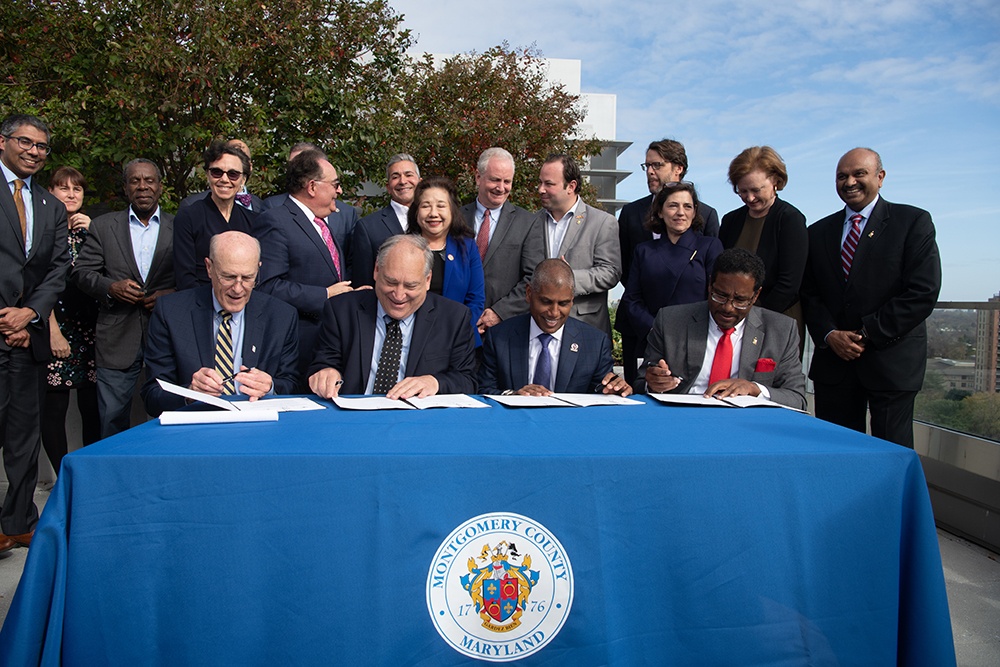
The University of Maryland, Baltimore (UMB) and its partners could become the East Coast Silicon Valley for health computing with a transformative partnership to establish the University of Maryland Institute for Health Computing.
The new era in data-driven biomedical innovation is being led by UMB, with its experts at the University of Maryland School of Medicine (UMSOM), and the University of Maryland, College Park (UMCP), in partnership with the University of Maryland Medical System (UMMS) and Montgomery County, Md., and collaborators from the Universities at Shady Grove (USG) and the University of Maryland, Baltimore County. The University of Maryland Strategic Partnership: MPowering the State (MPower) made the announcement in the fall.
Calling the institute “a big deal,” University System of Maryland Chancellor Jay A. Perman, MD, said the biomedical triumvirate of UMB’s top-ranked health science professional schools; College Park’s state-of-the-art expertise in artificial intelligence, virtual reality, and machine learning; and UMMS, which serves over 5 million patients, all linked through electronic health care records, is an indication of great things on the horizon in health care innovation.
The institute “joins together the deep expertise of the University of Maryland in advanced computing and the equally deep expertise of UMB and UMMS in human health,” Perman said. “When you leverage the first, advanced computing, to the second, our health, it’s a wonderful thing.”
USG and UMBC were later added to the initiative. At USG, the institute will leverage educational programs and develop training programs and experiential learning opportunities in the form of internships and fellowship opportunities for USG students. UMBC’s strengths in cybersecurity, computational science, and mathematics will be tapped.
The transformative partnership will establish North Bethesda as a national epicenter of computationally enabled biomedical research, population health, and precision medicine. Big data combined with state-of-the-art analytical approaches have the potential to greatly improve medical outcomes and population health.
The institute will leverage recent advances in artificial intelligence (AI) and computing to create a premier learning health care system that evaluates both de-identified — which removes patients’ identifiable personal information — and secure digitized medical health data to diagnose, prevent, and treat diseases in patients across Maryland.
“We are witnessing an unprecedented revolution in health care that is being driven by biomedical innovation, the digitization of medical records, and advances in machine learning and artificial intelligence,” UMB President Bruce E. Jarrell, MD, FACS, said in a news release. “This new institute will include all of these elements in a synergistic effect that will transform our health care system.”
The institute will incorporate technologies, including the use of machine-learning algorithms, to study emerging diseases and help establish precision patient care to halt disease progression. For example, poorly controlled diabetes, high blood pressure, risk of opioid overdose, and early kidney disease can be identified by trending changes in lab tests in outpatients, allowing targeted interventions to prevent disease progression. Such efforts will lead to improved care for the patient, yielding better diagnoses and treatments tailored to an individual’s unique health needs.
“The integration of ‘big data’ with artificial intelligence and immersive technologies in health care is fundamentally changing the way we will treat patients — enabling us to vastly improve and personalize care for each individual,” said Mark T. Gladwin, MD, vice president for medical affairs, UMB, and the John Z. and Akiko K. Bowers Distinguished Professor and dean, UMSOM. “Our vision is for this to become the East Coast Silicon Valley for health computing. The goals of this new institute perfectly align with the University of Maryland School of Medicine’s new strategic vision to utilize disruptive technology and embrace and harness the power of clinical analytics and precision medicine to enhance patient care and provide population health services.”
The excitement in the air was palpable at the fall announcement as stakeholders including university presidents, administrators, and lawmakers shared in the success of sealing the deal with a Memorandum of Understanding and a glimpse into the future of health care.
UMCP President Darryll J. Pines, PhD, MS, reminded the gathering of the “transformative leap” in medicine made by the sequencing of the human genome at the National Institutes of Health 20 years ago. “That happened right here in Montgomery County,” Pines said.
“We stand today at the cusp of another powerful revolution of medicine,” he continued. “We will harness our internationally recognized expertise in artificial intelligence, visual computing, and augmented and virtual reality programs. When we apply these strengths to medicine, we are creating an opportunity to revolutionize patient care and improve health and well-being for everyone.”
Mohan Suntha, MD, MBA, president and CEO of UMMS, noted he is proud of the partnership the system’s 12 affiliated hospitals have within the university-based health system.
“While we are delivering the care of today, we take on the responsibility of educating the future health care workforce,” he said. “We do this through partnership, and so when I look around today, I am incredibly excited about the partners that sit together to make this announcement.”
The institute is expected to open in leased space in early 2023, with final completion of laboratory and office space at the North Bethesda Metro location in 2028. Initial funding of $25 million is provided by MPower. The Montgomery County government will provide an additional $40 million to develop the North Bethesda site.
“When I think about the opportunity that’s in front of all of us, I want you to imagine that in the very near future the nation will describe Montgomery County as the Silicon Valley of health care computing,” Suntha said.
Montgomery County Executive Marc Elrich agreed, saying he is looking forward to the economic development the institute will bring to North Bethesda and the state.
“It’s going to be good for the state of Maryland. It’s going to be good for the residents in Maryland. It’s going to stimulate business growth and development, which is something we’re all interested in,” he said.



